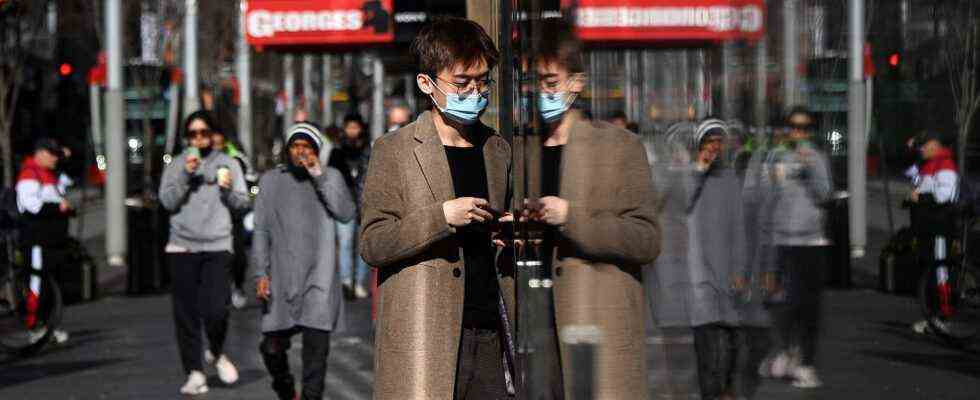Status: 02.07.2021 10:47 a.m.
Australia has long been considered a model country in the fight against the pandemic. But now the delta variant has spread here as well. And there is growing dissatisfaction with the country’s isolationist policy among the population.
By Jennifer Lange, ARD-Studio Singapore,
currently Hamburg
They wanted to get married a year ago. Instead, the Australian Bolivar and his fiancée Veronica from Ecuador only see each other via video chat. Australia closed its border right at the start of the pandemic. And don’t want to reopen until the end of 2022.
“It’s just heartbreaking. Every time I see her like this, thanks to technology. There’s just so much fear in my heart right now,” complains Bolivar.
Families are separated
With the border closure, Australia wants to keep the corona virus out. Unlike Europe, for example, the government is pursuing a no-Covid strategy. So she wants zero infections in the country.
Bolivar sees this with mixed feelings: “I understand that it was easy to close the borders and tell people that everything will be fine. That in a year the virus will be gone. But the government does not see the effects families are separated, they don’t see the human side of things. ”
Limousine drivers distributed the virus
But the Australian government is sticking to closed borders. So far she has been successful with it. Prime Minister Scott Morrison repeatedly emphasizes how well Australia has come through the crisis so far – with only around 900 deaths.
But although the country is largely cordoned off, there are isolated cases of corona. Just like in Sydney: A limousine driver who had driven an aircraft crew to a quarantine hotel spread the virus throughout the city. There is now a two-week lockdown to stop the spread.
Health advisor Bill Bowtell criticized on Australian television: “We really face the worst crisis of the Covid pandemic since the first days in February / March of last year. What makes it worse is that this was a largely preventable and predictable crisis. “
Every second Australian in lockdown
In the meantime, the particularly contagious Delta variant has spread to other parts of the country. Every second Australian is back in lockdown. If you include the stricter corona measures that have been reintroduced, 80 percent of the population are affected.
Ryan Kahn from Sydney can understand that his city is back in lockdown. He is sitting at home in the living room with his wife and two daughters. The outbreak of the Delta variant worries the family, he says on the phone. “I’m frustrated that New South Wales didn’t close earlier. This variant is much more contagious than the others.”
Another foreclosure policy?
So how do you get out of the crisis? Many researchers consider the zero-covid strategy to be fundamentally correct. But Australia cannot go on forever with its foreclosure policy, says Tim Soutphommasane from the University of Sydney.
Australia needs to start thinking about the next phase of the pandemic. The country cannot remain closed indefinitely or for an extended period of time without incurring significant economic, social and cultural costs. The challenge for Australia now is to think about how to safely reopen.
At first no vaccine – now great skepticism
In Australia, too, vaccination plays a central role in getting out of the pandemic. Herd immunity will probably not reach the country, say scientists. At first there was no vaccine, and now there is great skepticism.
Family doctor Brad McKay observes this every day in his practice: “We are victims of our own success,” says McKay. “We’ve had a couple of outbreaks and we’ve managed to get them under control. So a large part of the population has the attitude that we can just wait and see how things go.”
A survey by the Melbourne Institute shows that one in three Australians does not want to be vaccinated or is hesitant. The main reason is concern about side effects. And many see no need as long as the borders are closed.
The vaccination campaign in Australia is therefore slow. So far, just over five percent of the population has been fully vaccinated.
Risk of economic and social costs
At the University of Sydney, they fear that Australia could lose its lead over the rest of the world if the country does not make rapid progress in vaccinating. Soutphommasane said, “There is a real risk that other countries that have vaccinated populations will be able to resume economic activity and Australia will be left behind.”
Bolivar from Sydney also sees the economic costs. He works as a statistician. But the social costs hit him even more because he has not been allowed to see his fiancée for over a year. “I’m 52 years old, she is 40 years old, we’ve never had children and still want to start a family. It seems like there is no end, no light at the end of the tunnel.”
“Trapped on this huge island”
Ryan from Sydney, who otherwise welcomes the government’s policy of foreclosure, also recognizes that foreclosure cannot be a long-term strategy: “In some ways it feels like we’re a little trapped on this huge island, even though it’s safer than here elsewhere in the world. ”
And Soutphommasane says: “Australia as a covid-free paradise is an illusion. Perhaps it is even a fantasy. At some point Australia will have to deal with the world again. At least if it wants to remain a modern globalized society.”
The virus will be with the Australians for years to come. The government could not impose a lockdown on every case to get the numbers back to zero. Australia has to face reality: live with Covid or become a hermit nation.
Australia’s handling of the pandemic
Jennifer Lange, ARD Singapore, July 2nd, 2021 9:34 am

